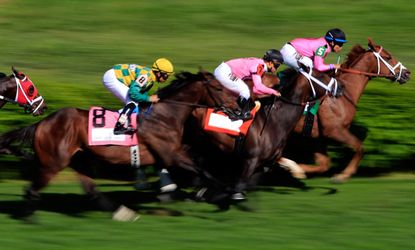Winning and losing isn't as important as the policy position of candidates

There's another elections hanging over us. Everyone is obsessing over two queries -- Who will get a winnable ticket? Which party will emerge the winner. But look a bit closely, and you start wondering; would the answers really make a difference? If so, how much?
We need to ask deeper questions. For instance: what is the role parties and their leaders play in shaping the country and our state? How do their politics differ from those of others? What are the short-term and long-term effects on us all of their politics and programmes? How does it take us forward as a people, and what impact does it have on our daily lives?
All of us having a connection with media -- as columnists, editors, and regular readers -- we need to ask another major question. What role does the media play in election coverage? Does it fulfil its duty? Offer insight? Or does it just see elections as a dog-fight, having to report which candidate got how many votes and which party won?
Even as we stay riveted to the drama of the elections, a whole lot of issues are slipping us by. Citizens are looking at the changes in the Town and Country Planning laws, and concerned about what impact these could have.
There are over 94,000 job-seekers on the Employment Exchanging listed in North Goa, and over 53,000 in South Goa. The government merely says "no such study" has been conducted on the employment situation in Goa. It goes on to argue: "However, merely registering with [the] Employment Exchange does not mean the persons are unemployed." What about job-seekers who are unable to register with the Employment Exchange, due to age or any other reason?
There also are issues related to education, Goa's health facilities, infrastructure for the citizen, electricity wastage ("leakages" or thefts), costs of power, environment, coping with diversity, corruption, and building amity among citizens, so much remains to be done.
This is true of regardless who is in power. Not that others in power have done a particularly fine job on this front. In fact, the rampant defections Goa has seen, especially in the 1990s and 2010s-2020s have made party politics seem a total farce.
Politicians cannot be held accountable for their sins of omission and commission (pun intended) guilty of while on the other side of the fence. In fact, once they cross over, all their sins are forgiven. Their former opponents treat them as if they are pure white and vestal virgins. There are just too many examples from Goa. More from across the country, including from the once-much-criticised NCP, Shiv Sena, and the Himanta Biswa Sarmas, Yedyurappas, Mukul Roys, Narayan Ranes, etc.
There are other issues which are relevant. The website journalistsresource.org reminds us that an election is not meant to be a "horse race". "It's unlikely journalists will stop covering elections as a competitive game, despite researchers' warnings that it can harm voters and others," adds the site. [http://t.ly/mseXX]
In short, it notes that winning and losing isn't as important as the policy position of candidates. Unfortunately, public opinion polls have grown and made things worse... journalists can now easily quantify voter support. In some elections, policy issues are found to receive just 10% of news coverage. Four times that figure is given to the "horse race".
The way opinion pollsters frame their question can shape how people respond too. It suggests other ways out. For instance, the media can incorporate into the coverage the candidates' qualifications, political records and legislative accomplishments (or lack of it). So could their role in corruption and other controversial cases be looked at, which is critical in a 'desi' context.
Groups like the ADR (Association for Democratic Rights), which comes out with its National Election Watch and other fact-sheets, have been doing an insightful job, but this is never enough.
Political reporters can learn from their sports colleagues, it has been suggested. Football fans often energetically interact with newspaper websites. It helps to bring in more opinions from readers. The same can be done for politics too. Readers can thus also engage with one another.
The media does influence elections. So how it undertakes coverage is critical. It takes decisions on whom to cover and how, bias, acting as an echo chamber at times (and helping those already ahead), creating lasting impacts through photos and visual communications, fact-checking (or not doing it), and deciding to act (or not to) as watchdogs of the people's interest.
Elections are too important for any country or region. The onus should not be only on the media, but citizens need to take a more active role in this.
Online, one can find 'citizens' tool-kits' that help monitor the media, to ensure fairness in the election process. Election campaigning in the 21st century is very different from the earlier times.
One such toolkit points out: "The role of television, the internet and other types of mass communication media is very important for most voters in determining their choice at the ballot box during elections."
Social media is an entirely different beast....
But, there can be differing views on this. Some studies suggest that, contrary to popular belief, "media exposure seems to have little relationship to voters' images of candidates. Their prior political attitudes and educational levels are much stronger predictors of these images." Meaning the biases, or preferences, are caused by other factors.
Whatever the case, these are all issues which really need to be taken seriously. Earlier one does it, the better.